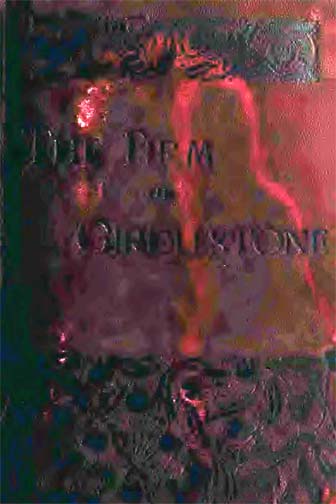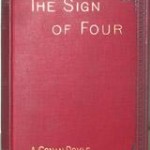
This episode had occurred about a fortnight before Ezra’s return from Africa, and was duly retailed to him by his father.
“You need not be discouraged by that,” he said. “I can always keep them apart, and if he is absent and you are present—especially as she has no idea of the cause of his absence—she will end by feeling slighted and preferring you.”
“I cannot understand how you ever came to let the matter go so far,” his son answered sullenly. “What does the young puppy want to come poaching upon our preserves for? The girl belongs to us. She was given to you to look after, and a nice job you seem to have made of it!”
“Never mind, my boy,” replied the merchant. “I’ll answer for keeping them apart if you will only push the matter on your own account.”
“I’ve said that I would do so, and I will,” Ezra returned; and events soon showed that he was as good as his word.
Before his African excursion the relations between young Girdlestone and his father’s ward had never been cordial. Kate’s nature, however, was so sweet and forgiving, that it was impossible for her to harbour any animosity, and she greeted Ezra kindly on his return from his travels. Within a few days she became conscious that a remarkable change had come over him—a change, as it seemed to her, very much for the better. In the past, weeks had frequently elapsed without his addressing her, but now he went out of his way to make himself agreeable. Sometimes he would sit for a whole evening describing to her all that he had seen in Africa, and really interesting her by his account of men and things. She, poor lass, hailed this new departure with delight, and did all in her power to encourage his better nature and to show that she appreciated the alteration in his bearing. At the same time, she was rather puzzled in her mind, for an occasional flash of coarseness or ferocity showed her that the real nature of the man was unaltered, and that he was putting an unnatural restraint upon himself.
As the days went on, and no word or sign came from Tom, a great fear and perplexity arose within the girl’s mind. She had heard nothing of the interview at Fenchurch Street, nor had she any clue at all which could explain the mystery. Could it be that Tom had informed her guardian of their engagement, and had received such a rebuff that he had abandoned her in despair? That was surely impossible; yet why was it that he had ceased to walk through the square? She knew that he was not ill, because she heard her two companions talking of him in connection with business. What could be the matter, then? Her little heart was torn by a thousand conflicting doubts and fears.
In the mean time Ezra gave fresh manifestations of the improvement which travel had wrought upon him. She had remarked one day that she was fond of moss roses. On coming down to breakfast next morning she found a beautiful moss rose upon her plate, and every morning afterwards a fresh flower appeared in the same place. This pretty little piece of courtesy, which she knew could only come from Ezra, surprised and pleased her, for delicacy was the last quality for which she would have given him credit.
On another occasion she had expressed a desire to read Thackeray’s works, the books in the library being for the most part of last century. On entering her room that same evening she found, to her astonishment, a handsomely bound edition of the novels in question standing on the centre of her table. For a moment a wild, unreasoning hope awoke in her that perhaps this was Tom’s doing—that he had taken this means of showing that she was still dear to him. She soon saw, however, that the books could only have come from the same source as the flowers, and she marvelled more than ever at this fresh proof of the good will of her companion.
One day her guardian took the girl aside. “Your life must be rather dull,” he said. “I have taken a box for you to-night at the opera. I do not care about such spectacles myself, but I have made arrangements for your escort. A change will do you good.”
Poor Kate was too sad at heart to be inclined for amusement.
She endeavoured, however, to look pleased and grateful.
“My good friend, Mrs. Wilkinson, is coming for you,” the merchant said, “and Ezra is going too. He has a great liking for music.”
Kate could not help smiling at this last remark, as she thought how very successfully the young man had concealed his taste during the years that she had known him.
She was ready, however, at the appointed hour, and Mrs. Wilkinson, a prim old gentlewoman, who had chaperoned Kate on the rare occasions when she went out, having arrived, the three drove off together.
The opera happened to be “Faust,” and the magnificent scenery and dresses astonished Kate, who had hardly ever before been within the walls of a theatre. She sat as if entranced, with a bright tinge of colour upon her cheeks, which, with her sparkling eyes, made her look surpassingly beautiful. So thought Ezra Girdlestone as he sat in the recesses of the box and watched the varied expressions which flitted across her mobile features. “She is well worth having, money or no,” he muttered to himself, and redoubled his attentions to her during the evening.
An incident occurred between the acts that night which would have pleased the old merchant had he witnessed it. Kate had been looking down from the box, which was upon the third tier, at the sea of heads beneath them. Suddenly she gave a start, and her face grew a trifle paler.
“Isn’t that Mr. Dimsdale down there?” she said to her companion.
“Where?” asked Ezra, craning his neck. “Oh yes, there he is, in the second row of the stalls.”
“Do you know who the young lady is that he is talking to?” Kate asked.
“I don’t know,” said Ezra. “I have seen him about with her a good deal lately.” The latter was a deliberate falsehood, but Ezra saw his chance of prejudicing his rival, and took prompt advantage of it. “She is very good-looking,” he added presently, keeping his eyes upon his companion.


